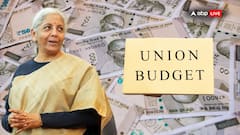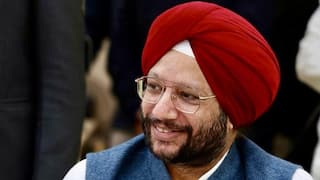Budget Session 2022: FM Nirmala Sitharaman To Table Pre-Budget Economic Survey, All Eyes On GDP
Known as the annual report card of the economy, the Economic Survey will reveal the most-watched numbers -the Gross Domestic Product (GDP) projections -for the next fiscal

New Delhi: This week remains crucial as the much-awaited Union Budget will be presented amid the third wave of Covid-19 on Tuesday followed by the economic survey on Monday. The government’s gross domestic product (GDP) data for 2020-21 will also be unveiled ahead of the budget.
This time, Finance Minister Nirmala Sitharaman will table the Economic Survey for 2021-22 in the Lok Sabha on Monday soon after the President's address to both Houses of Parliament. She will present the Union Budget for the next financial year beginning April 1, 2022, on Tuesday amid expectations of key announcements on spending plans, medium-term fiscal framework, tax structure, and measures for industries impacted by pandemic. The speech is also expected to throw light on other issues plaguing the Indian economy.
ALSO READ: Union Budget 2022: 'Union Budget Mobile App' — Know What To Find In It & How To Download
In the 2020 Budget speech, Sitharaman spoke for 160 minutes which is considered to be the longest in independent India’s history. In that year the finance miniter broke her own record of the previous year by 20 minutes. However, the speech in 2021 lasted for 100 minutes. With two pages remaining of Budget 2020-21, she cut short her speech as she felt unwell. This speech broke her own record of July 2019--her first Budget--when she spoke for 2 hours and 17 minutes.
Even as Sitharaman has held the record for presenting the longest budget speeches, the finance miniter is still behind former finance minister Arun Jaitley in terms of word count. In 2018, Jaitley’s 18,604-word speech was shorter only than the historic 1991 budget speech presented by Manmohan Singh.
It is to be noted that Budget speeches usually last 90-120 minutes.
Economic Survey
The Economic Survey 2021-22 will be tabled in Parliament by finance minister Nirmala Sitharaman on Monday. Known as the annual report card of the economy, the economic survey will examine the performance of sectors and suggest measures based on the analysis. One of the important details revealed in the Survey is the GDP growth projection.
The chief economic advisor (CEA) is traditionally is the main architect of the survey that is tabled in Parliament by the finance minister ahead of the Union Budget every year. This year, however, the document also a prequel of the Budget is being prepared by the principal economic advisor and other officials in absence of a CEA, with Krishnamurthy Subramanian returning to academia completing his three-year term last year.
As the CEA’s office was vacant until Friday after Dr V Anantha Nageswaran assumed the charge, this year’s survey has been prepared by the principal economic adviser, Sanjeev Sanyal. Reports suggest the survey will go back to being a single-volume report.
GDP Estimates
The Economic Survey 2020-21, released in January 2021, had projected a GDP growth of 11 per cent during the financial year ending March 2022.
Going by the provisional estimates of the government released in May 2021, GDP had contracted by a historic 7.3 per cent in FY21 which was hit by one of the strictest covid-19 lockdowns in the world. But the provisional estimates are based on fewer data sets.
The government is set to release the first revised estimates for FY21 on Monday. These will take into account detailed estimates of various sectors and public finance, giving a clearer picture of the economy. In the last two years, the first revised estimates have downgraded GDP growth numbers from provisional estimates and this cannot be ruled out for 2020-21.
The survey may project growth of about 9 per cent for the next financial year, the PTI report quoted experts as saying citing base effect.
The economy is expected to record a growth of 9.2 per cent during the current financial year, which is a few notches lower than the 9.5 per cent projected by the Reserve Bank, according to the advance estimates of the National Statistical Office (NSO), news agency PTI reported.
The economy contracted by 7.3 per cent during 2020-21 due to the Covid-19 outbreak and subsequent nationwide lockdown. The impact was comparatively less during the current fiscal as the lockdowns were limited and economic activity was not disrupted in a big way.
Related Video
Union Budget 2025: Arvind Kejriwal lists the shortcomings of the Modi government's budget | ABP News | AAP





































